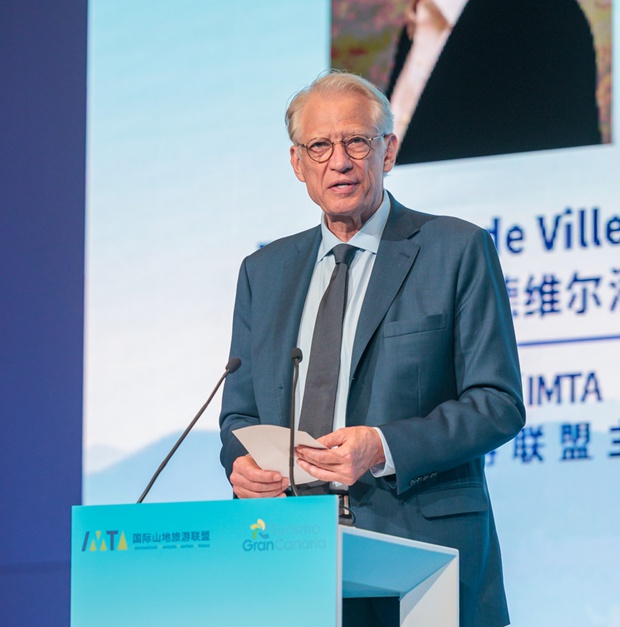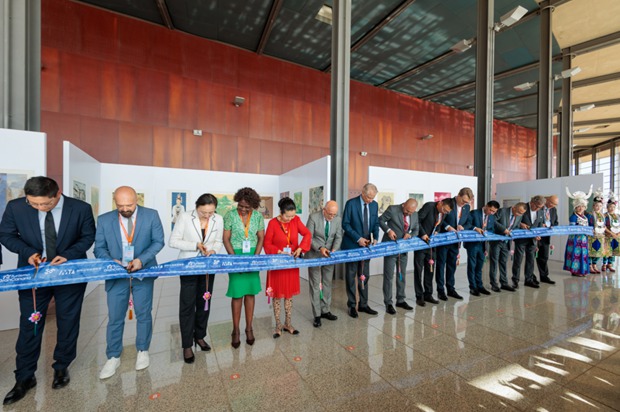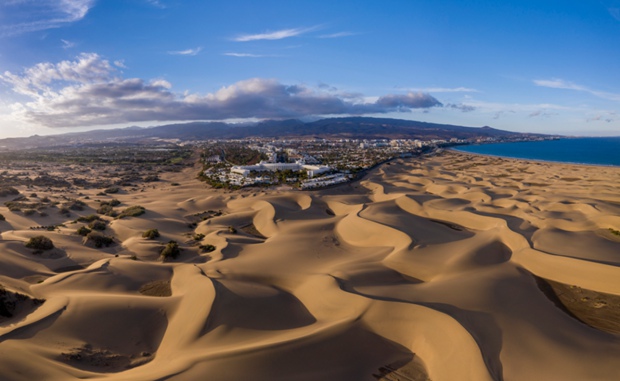Editor's note: On May 29, the "International Mountain Tourism Day 2025" Theme Events officially kicked off in Gran Canaria, Spain. Centered around the theme “Embracing Mountains and Seas, Coexisting with Cultures—Mountain Tourism and Cultural Inclusiveness for the Future,” the event brought together a diverse group of prestigious international organizations, government officials, industry leaders, experts, and scholars, and media professionals from around the world. The gathering aims to explore paths of inclusive and reciprocal global mountain tourism and shared development. A series of activities were held as part of the Theme Events, including the Opening Ceremony, the Theme Forum, the Exchange and Sharing Session of Mountain Culture and Tourism, the China-Spain Cultural and Tourism Exchange Exhibition, and the "Night of Gran Canaria" Welcome Dinner. Guests participated in various formats to exchange advanced ideas, discuss frontier issues, and deepen practical cooperation. At the Opening Ceremony, Dominique de Villepin, Chairman of the International Mountain Tourism Alliance (IMTA) delivered a speech.

The following is the full text of the speech:
It is truly an honor to be here with you on this special day on Gran Canaria, known as the "Island of Eternal Spring" in the heart of the Atlantic Ocean, as we come together to celebrate the 7th International Mountain Tourism Day. Since the International Mountain Tourism Alliance (IMTA) first proposed the establishment of this day in 2018, we have seen its theme events flourish across Nepal, China, Laos, France, and Spain. Each event has resonated with the development trends of our time through its unique themes and innovative forms. The IMTA has now emerged as a vital platform, not only showcasing the rich and varied values of our mountain regions but also fostering deeper exchanges within our industry and strengthening international collaboration.

The ribbon-cutting ceremony
Last year, we gathered in Nice, France, under the theme "Mutual Understanding among People through Mountain Tourism ". That remarkable event not only fostered mutual learning between Chinese and French civilizations but also propelled innovation in mountain tourism forms. This year, as we mark the 50th anniversary of China-EU diplomatic ties and the 20th anniversary of the comprehensive strategic partnership between China and Spain, this grand gathering, bridging mountains and seas, will carry forward the spirit of "mutual learning among civilizations". By bringing together the insights and expertise of industry leaders, it will be a powerful force in fostering cultural inclusiveness and deepening the bonds between China and Europe.

Guests Jointly Inaugurate the 2024 "International Mountain Tourism Day"
The global tourism landscape is being reshaped by deep-seated changes. As we look at the numbers, it is clear that international travel is bouncing back. Last year, travelers spent just as much as they did before the pandemic. Europe, with its solid tourism foundation and diverse cultures, is at the forefront of this recovery. Emerging markets like Asia and the Middle East are surging ahead, becoming new hotspots for growth. Yet, the road to recovery is uneven, with considerable differences across regions. The sluggish global economy, geopolitical conflicts, climate change, and energy crises are all putting the tourism industry’s resilience to the test.

Dolomites, Italy
Amid rising uncertainties, finding a way to foster balanced and sustainable industry growth has become a key concern. As tourism market demands change, mountain tourism has emerged as a powerful engine. It is not just fueling balanced regional economic development but also forging new pathways for international cooperation. Mountain ecosystems serve as the bedrock of terrestrial biodiversity and the cradle of rich cultural heritage, embodying the living essence of our diverse human civilizations. Speaking of mountain tourism development, we are really exploring how to safeguard our planet's ecological foundation and carry forward humanity's spiritual legacy. It is about honoring nature and fulfilling a shared duty within the global governance framework.

Altay, Xinjiang, China
Echoing this year's theme, "Embracing Mountains and Seas, Coexisting with Cultures - Mountain Tourism and Cultural Inclusiveness for the Future", we uncover a truth: Sustainable tourism thrives only when we honor diversity and welcome differences.
Looking ahead, mountain tourism must embrace a new paradigm - one built on resilience, inclusiveness, and sustainability.
First, by working together across regions, we can share resources and spread risks, making our systems stronger and more resilient. Take the Pyrenees, where France and Spain joined hands to create an ecological compensation scheme. It is a blueprint for cross-border ecological governance.
Second, we need to make sure that local communities get real benefits from tourism. This means they should have a say in how money is made, how cultures are passed down, and how decisions are made. We should create a system where everyone benefits, both hosts and guests. Take the "Indigenous Culture Mentor Program" in Machu Picchu, Peru, for example. It has really helped locals get a much bigger share of the revenues from tourism.
Third, the development of mountain tourism has redefined what it means to succeed. It is no longer about sheer numbers but about creating exceptional experiences that respect and preserve our natural and cultural legacies. This new paradigm prioritizes the quality of visitor experiences, the welfare of local communities, and the preservation of our natural and cultural assets.

Landscape of Gran Canaria, Image source: Turismo de Gran Canaria
Friends, as we gather on this land where mountains meet the sea, the mountains and waves around us are more than just natural wonders - they are reflections of our human civilization. Mountain tourism is not just about beautiful views - it is about honoring nature, respecting cultures, and looking out for the future. Mountains can be the ties that bind us together and the classrooms where we learn from each other's cultures.
Text and images source: IMTA
Editor Ⅰ: Zhang Wenwen
Editor Ⅱ: Bao Gang
Editor Ⅲ: Liu Guosong














